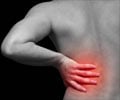Stress could slow down recovery from back pain, it seems. Unhappy workers and females living alone, for instance, recover from back pain slower than their less stressed peers, says a University of Queensland researcher.
Dr Nick Penney examined the relationship between lower back pain and psychological, physiological and social factors.His researched also focused on the bio-psychosocial model, which recognises the importance of biological, psychological and social factors in disease and illness.
“The model is now understood to be central in understanding human health in general, and pain in particular,” he said.
The five-year study showed that people working in a high-demand but low control environment such as an assembly line, or who had an unhelpful management style at work, were more likely to suffer from back pain and found it harder to recover.
Dr Penney, from the Sunshine Coast, also found that being away from work on compensation such as Work Cover was also likely to slow recovery, and that those who lived alone and with little social support also faced the same risk.
To gauge how accurate social and psychological factors were at predicting the recovery outcome of lower back pain, Dr Penney developed a questionnaire that was answered by 91 research participants in the Sunshine Coast, and a further 40 from the Bay of Plenty in New Zealand.
Advertisement
“For example, if someone agreed that back pain was dominating their life, they appeared to have a worse recovery prognosis than someone who disagreed,” he said.
Advertisement
However, Dr Penney said that diagnostic tools such as X-rays were still necessary in some cases where a significant trauma was sustained, such as a fall of a meter or more onto concrete, or when an underlying disease may present, known as ‘red flags'.
“In some cases, how we fear the pain and react to it can be more disabling than the pain itself,” he said.
“On this basis it is often unnecessary to go through lots of tests without the presence of any red flags.”
Dr Penney said he hoped his findings would encourage practitioners to be more aware that there are often many other factors affecting a patient with back pain, and that the solution may not be as simple as just treating the pain.
“You have to look at what else is going on in a patient's life, because everybody is different and you have to treat them in their own context,” he said.
“It's also about changing a patient's perceptions about what is going on, and helping them to understand why they feel better some days and not others, and what they can do for themselves”
While further studies will examine whether less stressed sufferers of back pain need less treatment, Dr Penney said that the average person could help avoid back pain by keeping fit and flexible and by managing everyday stress.
Source-Medindia
GPL/L













